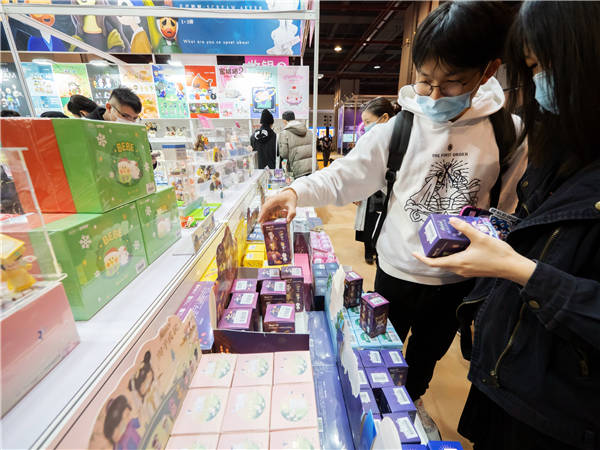 |
Visitors look at mystery boxes at the Elefun Pop Art and Toy Show held at Nan Fung International Convention and Exhibition Center in Guangzhou, Guangdong province, on Dec 20. [Photo by Li Zhihao/For China Daily] |
Zhuang Chuxian, 26, remembers her first Sonny Angel doll mystery box-in which she received one of the cherub-like figurines with a bobbing head and dressed like a sheep.
Over the past five years, she has collected more than 30 of the figurines, from various series.
"I like the way how they are perfectly arranged on my desk and windowsill. They bring out the inner child in me," she says.
Whether studying abroad or traveling, Zhuang will always carry that original sheep-themed doll "like a good companion".
It's a simple yet surprising concept, buyers do not know which model they will receive until they unpack the box, and it is "the variable reward" that provides an added dose of fun to the experience. Some may get a highly sought-after doll, while some may not-it's the luck of the draw.
Mystery boxes, or "blind boxes", can be traced back to Japan's capsule toys and lucky bags, while in China, the concept is quickly gaining popularity among Generation Z-ers, or those born in the mid-90s and early 2000s.
According to a report published by MobTech, a data intelligence technology platform, female white-collar workers and Generation Z college students in first-tier cities are primary consumers of mystery boxes, with female buyers accounting for 62.6 percent.
The report estimated the country's mystery box market to exceed 30 billion yuan ($4.59 billion) by 2024.
The boom in the segment has been certified by another report from e-commerce giant Alibaba's Tmall platform, which shows that the collection of figurines has overtaken fancy shoes and esports as the most popular hobby among consumers born after 1995.
About 200,000 consumers spent more than 20,000 yuan in the past year on mystery boxes on Tmall, the report noted.
Priced between 49 yuan and about 100 yuan, the boxes play into the philosophy made famous in the film Forrest Gump that "life is like a box of chocolates and you never know what you're gonna get", but at a relatively low price, according to psychologists and social observers.
Thanks to rising prosperity in China, millennials pay more attention to a product's "emotional value" than its practical functions, says Wei Wenqi, an associate professor of psychology at South China Normal University.
Without delay or deferment, consumers can get instant gratification by buying a mystery box, he adds, noting that the "hidden surprise" in the boxes induces a sense of fulfillment.
Many respondents said they feel it is one of the easiest ways to increase their happiness and a medium for social contact, as collectors can either exchange their identical figurines or trade them on the secondhand market.
"In the information age as people become more distant from one another, mystery boxes help them make friends with people who share similar interests and find a sense of belonging," Wei says.
However, experts warn about the dangers of addiction and overconsumption, especially for teenagers.
"We can pay for joy, but not for impulse," Wei says, advising parents and authorities to pay more heed to the sector.
Xinhua